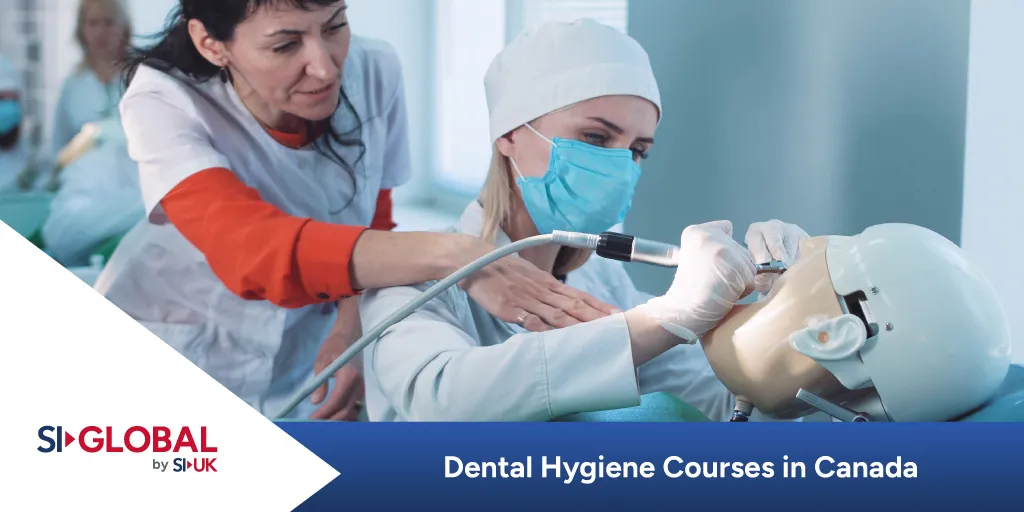A dental hygienist is a healthcare professional specialising in oral health. They work alongside dentists to help maintain good dental hygiene by performing various tasks. Their main responsibilities include cleaning teeth to remove plaque and tartar, examining gums for signs of disease, taking X-rays, and applying fluoride treatments to protect teeth. They also play a crucial role in educating patients about proper oral care, demonstrating correct brushing and flossing techniques, and advising on maintaining a healthy diet for strong teeth and gums.
Why study Dental Hygiene in Canada?
Thousands of international students join prestigious Canadian universities and colleges yearly to pursue their interests. Canada's education system is renowned for providing comprehensive curricula across all programmes, including dental hygiene courses. These programmes impart up-to-date knowledge and skills relevant to a thriving career in dental hygiene, including hands-on clinical experience that allows students to apply theoretical knowledge in real-world settings.
Gaining a globally recognised degree from a Canadian university or college enhances career prospects in Canada and globally. Learn more below, and to begin your application, arrange a free consultation today.

Popular Dental Hygienist Courses in Canada
Students interested in a career in dental hygiene have numerous study options in Canada, including:
Certificate Courses
Certificate courses offer a focused and practical pathway, combining classroom instruction with hands-on clinical experience. Students develop proficiency in dental hygiene techniques such as dental radiography, periodontal therapy, fluoride application, and dental instrument sterilisation. These programmes typically last 6-12 months and prepare students for entry-level positions.
Diploma Courses
Diploma courses cover various topics, including dental anatomy, oral pathology, radiography, periodontal therapy, preventive dentistry, and dental hygiene theory and practice. According to the Job Market and Employment Survey of the Canadian Dental Hygienist Association, around 87% of students choose diploma courses, which can be completed in 2-3 years.
Advanced Diploma Courses
Advanced diploma programmes provide enhanced training and specialisation, including coursework in periodontology, dental radiography interpretation, pharmacology, pain management, advanced clinical procedures, and evidence-based practice. Students engage in supervised clinical rotations and practical experiences, equipping them with the skills for leadership roles and specialised practice.
Bachelor’s Degree
These comprehensive four-year programmes combine theoretical coursework in dental anatomy, physiology, oral pathology, dental radiography, periodontology, and pharmacology with supervised clinical rotations in dental clinics or community health settings.
Master’s Degree
Master’s programmes offer advanced education and specialisation opportunities, allowing students to enhance their skills, knowledge, and career prospects. These courses include research components, enabling students to conduct original research and explore innovative approaches to oral health care.
Cost of Studying a Dental Hygienist Course
The cost of studying dental hygiene courses in Canada varies depending on the institution, programme duration, and location. International students can expect to pay tuition fees ranging from CAD 15,000 to 40,000 per year for undergraduate programmes, and CAD 7,000 to 46,000 per year for graduate programmes. Additionally, living costs range from CAD 7,000 to 20,000 per year, depending on the city.
Eligibility Criteria
Each university and college has its own eligibility criteria and admission requirements. Generally, applicants need:
- Academic Qualifications: A high school diploma or equivalent for undergraduate programmes, and an undergraduate degree for master’s programmes.
- Language Proficiency: Proficiency in English or French, demonstrated by test scores from PTE, TOEFL, or IELTS.
- Letters of Recommendation: From teachers or counsellors.
- Personal Statement: Outlining motivation, career goals, and relevant experiences.
- Interview: Some programmes may require an interview.
Application Process
- Find an Appropriate Course: Research dental hygiene programmes that align with your goals.
- Meet Eligibility Requirements: Ensure you meet all prerequisites.
- Gather Required Documents: Academic transcripts, test scores, letters of recommendation, personal statement, and proof of language proficiency.
- Apply: Submit your application via the institution's online portal.
- Await Admission Decision: Receive notification of the decision.
- Obtain a Study Permit: Apply for a study permit from Immigration, Refugees, and Citizenship Canada (IRCC).
- Accept the Offer and Enrol: Complete the enrolment process and register for classes.
- Prepare for Arrival: Arrange travel, accommodation, and orientation activities.
- Documents required
- Application form
- Academic transcripts
- Proof of English language proficiency
- Letters of recommendation
- Personal statement or essay
- Resume
- Passport and Visa documents
Career Prospects
Graduates can explore various career paths in dental clinics, hospitals, community health centres, educational institutions, research facilities, and public health agencies. Career options include Dental Hygienist, Oral Health Educator, Dental Researcher, Dental Clinic Manager, Dental Sales Representative, and Public Health Advocate.
Study Dental Hygiene in Canada
Book a free consultation today if you want to pursue a dental hygiene course in Canada.












